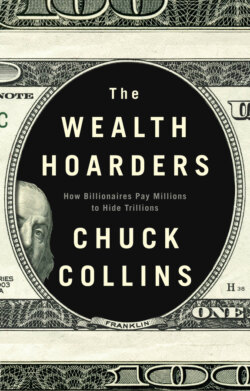Читать книгу The Wealth Hoarders - Chuck Collins - Страница 13
Introduction
ОглавлениеA family office in 1983 ensures that Dee’s dynastically wealthy New England family will remain wealthy for another century. They deploy “perfectly legal” mechanisms such as trusts to avoid estate taxes.
A Florida man named Joseph Rensin defrauds tens of thousands of working-class customers, but continues to live a luxurious lifestyle with his wealth protected in trusts based in the Cook Islands.
Isabel dos Santos, the wealthiest woman in Africa, plunders billions in wealth that rightfully belongs to the people of Angola and shifts it into offshore accounts.
The common thread in these three stories is the Wealth Defense Industry. None of these arrangements would have succeeded without a militia of tax attorneys, wealth managers, accountants, trust lawyers, and other advisors, that protect the interests of a narrow set of individuals and families against the wider community interest. The gatekeepers of these systems within “the Industry” will take umbrage that these disparate activities are lumped together. There is a difference, they will argue, between the money laundering depicted on Narcos or Ozark and the trust lawyer, sitting in a glass office tower, crafting an asset protection trust. They will argue that all their systems are legal and that they are obeying the law.
Yes, there are differences. But what these three stories – Dee, Blue Hippo, and Angola – have in common is a system of morally bankrupt wealth hiding that has mushroomed into a massive industry.
In April 2016, the Panama Papers were released to the world, a massive leak of 11.5 million documents, including the records of 214,000 offshore companies along with names of their real or “beneficial owners,” including passport scans. As journalist Luke Harding observed, a system “hidden in plain sight was revealed.”
The secret offshore industry – centered in tax havens like the British Virgin Islands – was not, as had been previously thought, a minor part of our economic system. Rather it was the system … The rich, it turned out, had exited from the messy business of tax long ago.1
A segment of this industry has written the laws, warped the rules, and created the loopholes. Joining with thousands of others they are now engaged in the morally suspect practice of helping their clients avoid taxes and other ethical responsibilities. Most practitioners look the other way, collect large fees, and repeat stories to justify their behavior and livelihoods. Perhaps these are good people caught up in a morally bad system.
Tom Keatinge, the director of the Centre for Financial Crime and Security Studies at the UK-based Royal United Services Institute, writes in the Guardian that banks are doing a better job ferreting out money laundering but are subverted by other players in the Wealth Defense Industry.
As banks build their defenses, an equally committed army of accountants, lawyers, consultants, and advisors works to subvert those defenses. They use every tool of financial engineering to hide ownership and obfuscate payments, ensuring that deniability is plausible and that the trail followed by any investigator will be fiendishly complex.
There remain other obstacles to overcome: shortcomings in national and international regulations, governments’ woeful underinvestment in their response to illicit finance, and a lack of transparency concerning company ownership. This means that, until there is a revolution in how we tackle illicit finance, the sharp minds that enable the theft of national wealth will remain one step ahead of any would-be regulators.2
The human cost of allowing the current system of professional enablers is very high, as we will discuss in Chapter 1. The ability of nations to build their economies, tax citizens, and make public investments is being compromised at a dizzying pace. As our societies reel from the Covid-19 pandemic, we have developed a deeper understanding of how decades of tax dodging and public austerity led to insufficient investments in public health and equity. Tax shifting contributed to the fragility and extreme inequalities that were the “pre-existing conditions,” the determinants of who lived and who died. In the face of trillions in deficit expenditures in response to the health emergency and its economic disruption, we should anticipate an acceleration of wealth hiding. Like freeloaders trying to slip out the back door of the restaurant when the bill comes due, the wealthy will be hiring their wealth managers to engineer their escapes.
